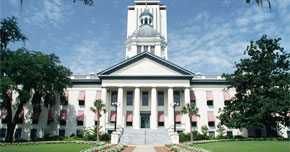Florida Lawmakers Finish Up Budget Deal
April 29, 2013
Lawmakers sealed an agreement on a $74 billion budget deal late Sunday for the fiscal year that begins July 1, locking down language on $480 million in teacher pay raises, a new formula for paying hospitals under the Medicaid program and a few projects for key lawmakers’ districts.
The agreement came well ahead of a Tuesday deadline for hammering out the final budget bill — something lawmakers highlighted — and after days of negotiations that included 30 public meetings, according to the counting of Senate Appropriations Chairman Joe Negron, R-Stuart.
 Lawmakers still have to hammer out compromises on a handful of budget-related “conforming” bills.
Lawmakers still have to hammer out compromises on a handful of budget-related “conforming” bills.
It was also the first time in years that state revenues kept lawmakers from considering deep cuts into programs like education and health care.
“Even though our budget picture is brighter than it has been before, we didn’t go on a spending spree,” Negron said.
Under the deal on teacher pay raises, one of Gov. Rick Scott’s top two priorities, teachers rated as “effective” would receive a raise of at least $2,500, while those rated “highly effective” would get $3,500. The raises wouldn’t be paid out, though, until June 2014.
Scott, who had pushed for a $2,500 across-the-board raise, still hailed the agreement in a statement late Sunday. His office said the proposal could pave the way for every teacher to get a raise of at least $2,000.
“I want to thank the House and the Senate for ensuring that we build on our work to implement performance pay, while also allowing school districts the flexibility to use the $480 million in new funding to give every Florida teacher a pay raise,” Scott said. “Our teachers are some of the best in the nation and they deserve to be rewarded for their great work.”
Scott’s initial plan — which was also set at $480 million — had called for the pay raise to be split among classroom teachers. While the House and Senate proposal applies to a wider array of school workers, lawmakers said they were confident that the funding would cover the raises.
Florida Education Association President Andy Ford, also quoted in Scott’s release, also applauded the agreement.
“Through the collective bargaining process, FEA remains committed to working with local school districts to develop fair, valid, reliable and transparent processes to reward the success of Florida’s teaching force,” Ford said.
The fine print of the budget agreed to Sunday night also sets a new formula for hospital reimbursements for services provided to Medicaid patients. The details of that formula — known as diagnosis related groups, or DRGs — were closely watched, though safety-net hospitals had already secured enough funding in earlier talks to be comfortable with the change.
During the conference meeting, Negron also laced into the “turkey list” released annually by TaxWatch, a nonprofit organization whose annual report logs so-called budget turkeys. Negron called out the group’s tendency to zero in on projects that were added in the conference process or weren’t recommended by agencies.
“If you check the Florida Constitution, it’s the responsibility of the Legislature to write the state budget,” Negron said.
His statement came as questions were raised about a project at Gulf Coast State College, in the district of Senate President Don Gaetz, R-Niceville. The project went from $300,000 in the Senate budget to $17.5 million in the Senate’s initial offer on education construction projects Saturday; it was dropped back to $14 million through a change approved Sunday.
The $14 million amount for the project, which was initially entitled “Advanced Technology Center” but is now set to be listed as “construct STEM building” — for science, technology, engineering and mathematics — still amounts to an increase of nearly 4,567 percent from the amount in the first Senate budget.
Gaetz’s spokeswoman confirmed that the Senate president selected the projects that would appear in the Senate education construction budget. The Gulf Coast State College project was not included in the list of priorities submitted by the Department of Education.
“The DOE’s not in charge of writing the state budget,” Negron said when asked about that on Sunday.
By The News Service of Florida



Comments